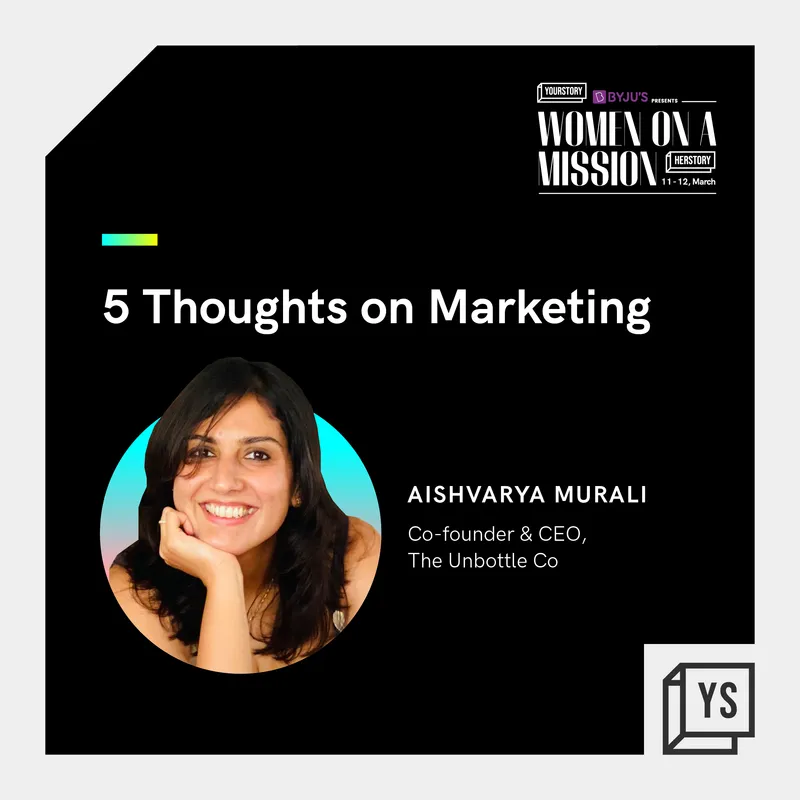Ex-Ola and Unilever marketing exec Aishvarya Murali on five key marketing insights for brands
With the aim of empowering women entrepreneurs and leaders, HerStory’s Women on a Mission Summit had Aishvarya Murali putting down her thoughts on marketing based on her experience, what she knows, and what she’s learned along the way.
The Masterclass: 5 thoughts on Marketing by Aishvarya Murali, CEO and Co-Founder of The Unbottle Co was one of the highlights of HerStory’s Women on a Mission summit, as far as learning goes.
Aishvarya, who has over 16 years of marketing experience that spans across companies such as and Unilever, had her workshop revolve around the context of today’s marketing, yesterday’s marketing, and how these two tie back together because the principles remain the same.
Presently, she consults Series B and Series C startups on how they should set up their marketing which includes branding and the digital medium.
She’s been involved as a consultant with companies such as and wellness platform . In 2022, she ventured into founding , a brand that offers clean haircare and skin care products that are packaged in 100 percent recycled ocean and landfill plastic.
Following are the key takeaways from her session:
The oxymoron of happy tear-jerking campaigns
Starting off the masterclass, Aishvarya addressed campaigns and the oxymoron of the “happy tear-jerking campaigns” that move people around the world. Several large corporations use it as a part of their marketing strategy to create a human connection. More often than not, it makes it to the headlines. But on the other hand, there is Customer Acquisition Cost (CAC) which is all about how many customers one has obtained, the traffic, amongst other performance metrics.
“The huge dichotomy is that I get asked how I look at one versus the other,” she says, “There are all these brands and agencies that want to create award-winning communication.”
Starting out with stories
“It always starts with a story… And it’s extremely important to tell that story well.”
Citing the example of Brian Chesky and Joe Gebbia, coming up with the idea of Airbnb, Aishvarya said, “The simple start of just renting out air mattresses in their apartment, and becoming a billion-dollar company serves as an example of how storytelling can create impact.”
The other instance discussed was that of Kevin Systrom, Co-Founder of social media giant Instagram. He uploaded the first image on Instagram, and the picture was that of a stray dog in Mexico. It became so popular that Kevin once remarked that he would have taken a better picture had he known how popular it would become.
But it also just isn’t about the story alone, so the next step is to look at whose story is being told. While the founder’s story is the crux of all things marketing, the narrative also needs to be twisted to accommodate the perspective of the consumers.
It’s always consumer insights that birth different kinds of businesses. When people want products and services that will make their lives easier, the market is faced with finding a solution to problems and pain points.

Sometimes, the consumer doesn't mention what the problem is, but it is up to innovators to find that gap in the market and fill it with their offerings. “Nobody ever articulated that they want to look smart and know things without asking people,” elaborates Aishvarya, “But of course everyone would want this, so that insight is how Google was born.”
Business, marketing, and humans
Aishvarya noted that a large part of the audience assumes that marketing is proportional to advertising and campaigns. There’s the idea that it has to do with the design, font, and logo, but it is all those things and more.
Marketing starts off much before these aspects. Business has to first meet and understand the human beings that it is aiming to impact. The business models and strategies have to be developed around the needs, and aspirations of the consumer. “It always starts with business meeting the human being.”
She demonstrated this statement through a conversation between business and marketing. It boils down to businesses making products based on what the consumer wants, and the kind of service or product that they’re looking for. At the same time marketing has to be confined within the boundaries of what businesses can actually deliver.
Marketing and businesses need to speak to consumers the way they want to be talked to. Apple was brought up as a key analogy. The bottom line is, most Apple consumers aren’t comparing the features and price of the product. Instead, they look at the design and the creativity that fuelled the products. That is the reason that Apple’s marketing and communication has also been tailored to this kind of consumer base. Whether it is the way the company holds events or builds its website, the consumer is always at the back of their minds.
Brand and performance marketing
According to Aishvarya, both brand and performance are incredibly important and neither can be forced upon the other. Brand marketing, for instance, focuses on getting the right people to know about the brand and resonate with it. It’s measured by relevant reach, brand quality metrics, and organic traffic.
Performance marketing, meanwhile, is about getting the right people to transact and act upon their needs in a way that builds revenue to the business. The objective here becomes very different.
That’s why questions regarding whether to prefer brand or performance marketing causes problems. Blending the two or ignoring one in favour of the other results in confused marketing and confused people, which is not ideal.
“Brand makes performance work harder,” Aishwarya says, “And performance harnesses brand’s hard work.”
A shout out to the sponsors of Women on a Mission Summit 2022, an Initiative by HerStory, by YourStory - BYJU’S, the presenting partner, and other sponsors - Kyndryl, Sequoia Spark, Zilingo, Atlassian, Akamai, Freshworks for Startups, and Netapp Excellerator.

Edited by Ramarko Sengupta








